Alan Jones: Dario Argento & Beyond…
As a little added bonus to last week’s Saturday Night Movie Sleepovers‘ podcast on Dario Argento’s Deep Red (1975), this week we’d like to present a conversation that our very own J. Blake had, way back in October of 2013, with British film critic, journalist, author and Argento expert, Alan Jones.
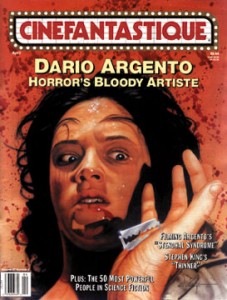 Jones runs the Frightfest film festival in London, has contributed to many publications (Empire, Premiere, Fangoria and the iconic Cinefantastique to name only a few), can be heard on numerous noteworthy Blu-ray and DVD audio commentaries and is the author of The Rough Guide to Horror Movies and the definitive Dario Argento guide, Profondo Argento: The Man, the Myths & the Magic (with its latest edition being titled Dario Argento: The Man, The Myths & The Magic).
Jones runs the Frightfest film festival in London, has contributed to many publications (Empire, Premiere, Fangoria and the iconic Cinefantastique to name only a few), can be heard on numerous noteworthy Blu-ray and DVD audio commentaries and is the author of The Rough Guide to Horror Movies and the definitive Dario Argento guide, Profondo Argento: The Man, the Myths & the Magic (with its latest edition being titled Dario Argento: The Man, The Myths & The Magic).
A few years ago, actually on the eve of an unforgettable sold out Goblin concert at Music Hall of Williamsburg in Brooklyn NY, Mr. Jones was nice enough to take Blake’s call and chat about his passions for horror movies, Argento, disco and the Sex Pistols; an odd combination I know, but he is a complex and interesting guy.
So take a few moments, sit back with a glass of wine and read forth…if you dare!
(The interview is presented in an alternate font, to make it easier to read.)
J. Blake: I want to thank you for giving me a few minutes of your time.
Alan Jones: No, no, it’s not a problem. It’s easy enough. I’m usually working all throughout the weekends anyway. So that’s the best time when you can get me at home. So it’s all good.
JB: I’m just wondering, do you have any new projects that you might want to talk about?
AJ: I’m working at the moment with director Nicholas Winding Refn on a book project that we’re doing together. It’s sort of secret. I can sort of allude to it in various forms, but he’s been here this week from Denmark and we’ve been trying to sort out exactly the direction this is going in, and I’m very, very happy with it and so that’s what I’m doing currently at the moment.
I leave next week to attend a film festival in Spain. And so on so on. So, yeah all good news, and then when I get back I’m doing some onstage interviews with George Romero and Dario Argento. So I have a pretty good rest of the year coming up.
JB: It is kind of amazing. You’ve got the “fan boy” dream job.
AJ: No, could be. I mean, you know, I did earn it. I’ve put in the hours and I’ve done loads of stuff, you know. I’ve been writing for magazines since like 1977, so…
JB: I didn’t mean to imply that you didn’t earn it…
AJ: No, no. Listen, no offense taken whatsoever. You can ask me anything. I don’t care. (He Laughs)
JB: I have a big interest in horror films and I know you’ve written books about the subject and you’ve talked a lot about your passion for them. I was wondering, in your opinion, what do you think it is about them that attract such a passionate audience?
AJ: Oooh, um…it’s seeing something that you’ve never seen before; that you’re going to be frightened by that is going to gross you out. I mean I used to love this stuff when I was a kid, because I just never knew what to expect and like everyone else, I do like the feeling of being frightened, you know in a sort of, communal space. Which is one of the reasons why I will advocate forever for watching these films in cinemas and film festivals. I mean watching things on TV or on DVD or however you watch them these days, online, isn’t the same. I think it is a shared experience, this stuff and I think you get more out of it as a result of that. I don’t know.
It’s interesting isn’t it? I mean, what fascinates us about that, about death anyway? And we’re all going to face it sooner or later. I just think it’s a case of sort of stalling it for a few moments, for 90 minutes. You know? You’re watching it from a safe place in the dark. But all this stuff. All these things to me are like pretty obvious cliché things to say. I don’t think anyone’s ever said anything that’s been any different. I just think that I recognize like minds when I meet them and if you’re a horror fan you’re a friend for life of mine, because you can sit there and talk about the things you like. We often sometimes share the same sort of moments we like in movies; often we don’t. We can argue about it. That’s what I think it’s all about. I’ve never really analyzed it that much, to be honest with you. I just know that I love seeing horror movies. I love the thrill of anticipation. Is this one going to really freak me out? Make me jump? I’m not talking about lazy jumps, like in stuff like The Conjuring, where a sound effect comes up. Not that sort of thing. Something that really, really gets under your skin and makes you really think long and hard. And I tell everybody this. The last film that really did that; I mean there’s been films all throughout the years, everybody knows them, but the last one that really got to me was Martyrs, the French movie, if your familiar with that. I’ve been a massive advocate for that film ever since in came out.
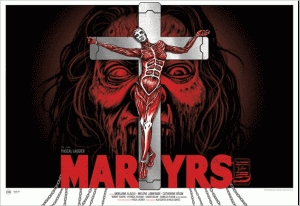
JB: One of the things I find interesting about the genre is that it seems to possess many of the most clear cut examples of the auteur theory.
AJ: Mmm-hmm.
JB: I’m not exactly sure why that is, but people like John Carpenter, (David) Cronenberg, obviously Argento and Romero; it is also interesting that they all seem to be from the same generation. When you look at cinema, post-60’s into the 1970’s, it seems like that’s where the auteurs really seem to shine.
AJ: Mmm-hmm.
JB: I don’t know if you’ve ever looked at it that way or if you have any thoughts on it. Like why that might be?
AJ: Well, the 60’s and 70’s in general is an amazing period for all sorts of cinema, not just horror cinema and I think it’s just the way it was. Just like the 60’s in London, which I think was sort of ground zero for everything. I mean the new wave (of horror filmmakers), of course, all come from the early 80’s, the video generation, because they watched everything that they saw on video then they wanted to copy it themselves. I’m talking about the Eli Roth’s, the Adam Greens, the Lucky McGee’s. All those sort of people, they’ve taken over now I think. I think people do tend to bang on a bit too much about the old school directors. Of course they’re valid and I’ve followed them and I’ve met all of them, but it’s a case of I think you have to look at where it’s all going now and I think there’s a lot of really nice keen talent out there that’s taking us into new areas. Before horror was very much like 6 or 7, 8 subjects. Now there are so many different sub-genres and so many different extremes you can go to, I think this is an even more exciting time. And I think horror’s always allowed you free range of your imagination, no matter how twisted that imagination is. I just think that when you’ve got no money, when you’re making your first film, you tend to veer towards horror, because it’s an easy market to sell if you need to. Especially now when the technology is like so nothing and you can just make a movie for less than ten thousand dollars if you like. I just like that sort of melting pot of new creative talent coming into the field.
We always get, with my film festival Frightfest, everyone always says, “Can’t you get some of the old people like John Carpenter? Like David Cronenberg?”
Well part of the problem is, Carpenter and Cronenberg, they’re not interested anymore. They did their bit. They just don’t want to know. I mean they’ve moved on or in Carpenter’s case, not doing anything. And he doesn’t want to do anything. So as much as we lionize these people, we’ve got to give them space. People like George (Romero) and Dario (Argento), they don’t mind going out there to a lesser extent and obviously Roger Corman. He’s still all over the place. I just think the whole landscape has changed, but we’ve still got a group of really exciting talented people. But people still talk in terms of the Carpenters, the (Brian) De Palmas and that was then and this is now. And I think that’s a good thing. I like the way the genre keeps evolving. It’s kept me interested…
JB: Of course.
AJ: And it kept me in a career. If I was stuck in that, I don’t think I’d be doing anything. I get so many people who say to me, “Oh the glory days of Italy are over. Lucio Fulci is dead. Blah blah blah…Michele Soavi.” Yes it is and so you have to move on. You can’t just keep writing and banging on about the same few movies. So yeah…it’s a roundabout way of saying to you that I think there are different places and different times for a whole new set of people to come along.
JB: I totally agree. I was just using those guys as examples…
AJ: No. No. I understand completely. I mean you say to John Carpenter, “Come on over to England. We’ll pay for this. We’ll do that.” Oh you know he just can’t be bothered moving. So fine.
JB: (laughs)
AJ: You know, if he doesn’t want to do it, (He laughs) you know let him go with it. You ask somebody like George (Romero) to come over he’ll say, “Yeah, sure I’ll come.” Because he’s so free and easy that way and he’s great. So you know, what can you do?
JB: Whether I previously knew your work or not, I can’t recall, but I first got to know you and your work by name with your book Profondo Argento.
AJ: Oh yeah.
JB: And with doing a little bit of research, there are a lot of mentions to a book called Mondo Argento.
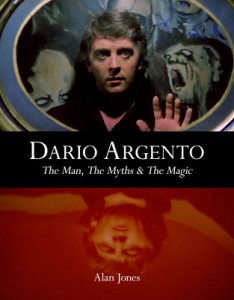 AJ: Yes, when I first brought Dario to London for a major, sort of, retrospective at the National Film Theatre here, I did a tie-in pamphlet that really put all of my writings together up to that point in time. We’re talking ’93 or ’94. I did that solely as a moneymaking enterprise, to make cash to be honest with you. I was bringing him over and I just threw it all together and sort of put it out. So basically what Profondo Argento is, is Mondo Argento completely reformed, redone and expanded upon and of course the new version Dario Argento, as I just call it, because some people thought Profondo was actually in Italian, is now the complete rewrite up to date with Dario’s career up to Dracula and beyond. So that’s what I did with that, but that’s all Mondo Argento was, was just something I did as a tie-in for that particular season at the National Film Theatre in London.
AJ: Yes, when I first brought Dario to London for a major, sort of, retrospective at the National Film Theatre here, I did a tie-in pamphlet that really put all of my writings together up to that point in time. We’re talking ’93 or ’94. I did that solely as a moneymaking enterprise, to make cash to be honest with you. I was bringing him over and I just threw it all together and sort of put it out. So basically what Profondo Argento is, is Mondo Argento completely reformed, redone and expanded upon and of course the new version Dario Argento, as I just call it, because some people thought Profondo was actually in Italian, is now the complete rewrite up to date with Dario’s career up to Dracula and beyond. So that’s what I did with that, but that’s all Mondo Argento was, was just something I did as a tie-in for that particular season at the National Film Theatre in London.
JB: With the books and the commentaries you’ve done for his films, your passion for Dario Argento’s work is well documented.
AJ: Mmm-hmm.
JB: I taught a class on the history of horror films here in New York for a few semesters and for me it was very important to represent Italian horror and his work specifically, because of my passion for it, but I also felt like I needed to warn the class. I find that people either get it or they don’t. His work either strikes a chord and you connect with it immediately or you just don’t. There doesn’t seem to be a whole lot people that are on the fence when it comes to Argento — at least here in America anyway.
I know that you’ve said that your introduction to his work was seeing The Bird With Crystal Plumage in the theater. What do you think it was about that film and that experience that really connected with you?
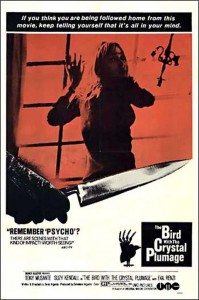 AJ: You know, I think it’s interesting and I’ve actually been thinking about this, because I have to do an intro to Dario on stage in a couple of months, and I’ll never forget it. I just went to see the movie here (in London), under a different title of course, and it’s one of those moments I can recall crystal clearly, because from the moment it started I was just completely galvanized. I just could not believe what I was watching. I thought it was the most exciting film I’d ever seen in my life visually. I mean I didn’t know that in those terms, because I was quite young back then, but it really spoke to me in a way that was just so amazing. I now have a house in Italy. I go there like once a month. I mean all my friends are mainly Italian. Perhaps it was some part of lying in my background, you know, from a past life or something that meant that I would gravitate towards this. I don’t know, but all I’m telling you is that when I saw that movie I thought that it was the most exciting innovative thing I’d ever seen in my life and literally I remember sitting rigid in my seat and I just could not wait to see the next film.
AJ: You know, I think it’s interesting and I’ve actually been thinking about this, because I have to do an intro to Dario on stage in a couple of months, and I’ll never forget it. I just went to see the movie here (in London), under a different title of course, and it’s one of those moments I can recall crystal clearly, because from the moment it started I was just completely galvanized. I just could not believe what I was watching. I thought it was the most exciting film I’d ever seen in my life visually. I mean I didn’t know that in those terms, because I was quite young back then, but it really spoke to me in a way that was just so amazing. I now have a house in Italy. I go there like once a month. I mean all my friends are mainly Italian. Perhaps it was some part of lying in my background, you know, from a past life or something that meant that I would gravitate towards this. I don’t know, but all I’m telling you is that when I saw that movie I thought that it was the most exciting innovative thing I’d ever seen in my life and literally I remember sitting rigid in my seat and I just could not wait to see the next film.
When I did actually get to meet Dario, it was the thrill of a lifetime for me. I say he made my obsession my profession and it is true. Perhaps I would have ended up being a film critic/journalist/whatever I don’t know, but that really did set me on the path of becoming one. I just wanted to know all about him, all about Italy.
I spoke to (Quentin) Tarantino about this once. I said to him that I thought it was interesting that these films, at that time, showed you places that you’d never go to and the exotic stuff and that you were literally being a tourist in these movies. I mean Rome looks so fabulous in ‘Plumage that I just couldn’t wait to visit it. You know what I mean? That didn’t happen a lot, I can’t honestly say that I went to some 60’s spy movies and thought “God, I must visit Russia” or wherever, but in this case it was like, “Oh my god, it just looks so great!” That was what it was. I think it really sort of lit a fire in me that was there somewhere, but through his work, in whatever way, whether it’s from the violent point of view, from the stylish point of view, from the art point of view, it spoke to me in so many ways.
I feel really, really sort of lucky to have actually met the person who I love most in cinema and he let me into his universe and his life and I could be on every single film (set). I mean it’s just amazing to me. I don’t think anyone has ever been able to have that. So it’s been good.
It’s been tough too. He’s not an easy man to get along with. We’ve been up and down. We’ve hated each other as much as loved each other through the years, but it’s a case of…well you know as you’ve read the book, you know that if I don’t like the stuff that he does I will tell him. And as a result of that I think that’s what’s made me stay a satellite around him whereas a lot of the people have fallen away, but I think that’s what it is. Because he knows quintessentially that deep down I absolutely adore him and adore his work and I always have. I mean it’s quite a modish thing to say that after Opera he hasn’t ever been the same. I would disagree with that. I think that Non Ho Sonno/Sleepless is just brilliant and I do love parts of Stendhal Syndrome. I don’t like Dracula. I don’t like Mother of Tears, but there are flashes of brilliance every now and again that he brings up. I think he knows that his best days are behind him, but I mean, so what? He gave the world ‘Crystal Plumage, Deep Red, Suspiria, Tenebre. These are masterpieces, and Inferno is my all time favorite film, ever. So what more can I say? He set a trend, I followed and I’m still following it. (He laughs) So it’s all very exciting. I’m going to Rome. He’s just directing a new stage version of Macbeth, so I’m going to go over to see that.
JB: I also love Inferno. It very well could be my favorite of his films as well.
AJ: Mmm-hmm.
JB: Why do you think people gravitate toward Suspiria? Is it because it was first?
AJ: Yeah…
JB: For me Inferno is like he took everything he was testing out in Suspiria and perfected it.
AJ: I couldn’t agree more. That’s a good way of putting it, because Suspiria to me…I do love it and for an in your face, visual, instant impact film, it’s like no other that you’ve seen. It has to be in everybody’s top 10. It has to be when it comes to discussing horror or else I won’t take people seriously, but for me Inferno is like, he’s sort of like sanded it down. He’s smoothed it off. He’s actually explored the themes he brought up in Suspiria. It’s less vulgar, it’s less…I mean it’s just less…raw I think. Which is what a lot of people liked about Suspiria, but I actually like what he did with Inferno, and I think it is the most beautiful film outside of the (Mario) Bava cannon. I think it’s Dario’s most beautiful film. I just love it. I watch it literally about once a month, because I just think it’s still so brilliant. There’s the scene with the music, where, you know, the music stops and starts; the death scene with Eleonora Giorgi is just so brilliant.
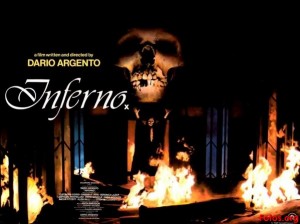
I’ve argued with Dario over three films; Phenomena, which I still hate, Inferno which he doesn’t like, but I love, and Opera, which he hated to begin with and I brought him round to liking, because he now sees a value in that film where he never saw it before. That film was so tinged with tragedy for him, because of his father, that he found it very, very difficult to watch. So we’ve discussed this at length and Inferno, he still sometimes sort of like nods his head and goes “Oh God, Inferno, your still banging on about that?”
JB: (laughs)
AJ: But it’s because I still love it and again, you see, he was quite ill when he made that, as you probably know, and the problems he had with that, with Fox not wanting to release it. It was just really, really bad. We were lucky to get it in the U.K. actually, because it sort of, like lurched out by mistake whereas in America I don’t think it was ever properly theatrically released. But all his films…his films have a special meaning to him as well, like his work has a meaning to us, but Inferno, for me is just a stunning piece of work and I just love every single moment of it. (He laughs)
JB: I began getting into Argento’s films when I was in my early-20s and my path with his films was probably not the norm, in that the first thing I saw of his was his half of Two Evil Eyes.
AJ: Oh, right.
JB: Then I saw Opera and Suspiria and I was absolutely hooked. When I finally saw Inferno it just totally captured my imagination and at that time, even though it was my favorite and I had seen it several times, I couldn’t have told you what the hell was going on it. Since then, I think I’ve figured it out, but then (laughs) I had no idea…but it didn’t matter.
I’ve heard you say, “You can take any frame from any Argento film and hang it in a museum.” And I think that especially applies to Inferno. It is just stunning.
AJ: Mmm-hmm. I don’t know if you’ve seen Hélène Cattet and Bruno Forzani movies Amer or Strange Colors of Your Body’s Tears, I don’t know if you’ve seen either of those, but if you have it’s almost like they’ve taken the Inferno template and they’re following on with it. Where the story really doesn’t matter, it’s just sort of like a gallery of fabulous images all about sex and violence. And I just think that’s what’s so great about Inferno. People keep going on and on about it not having a story. To me that is the least important part of it. It’s more of a feeling and I just love it for that reason.
JB: Totally. I used to tell my classes when I would show Argento’s work, “You can’t judge his films with the same criteria you would most other films.” They’re just visceral and if you can just embrace that about them — I think if you can open up your mind to that and really experience them instead of just watch them, I think people would find them more accessible.
AJ: And of course now the dubbing makes it look even more distancing, doesn’t it? We’re used to that sort of thing, but people aren’t that much anymore. And so as a result of that I think it actually can be quite an off-putting thing to go through.
JB: I agree. To switch gears a bit: Argento has often been compared to Hitchcock.
AJ: Mmm-hmm.
JB: Aside from the fact that they both primarily dealt in thrillers, do you think that is really an accurate comparison?
AJ: No. I thought it was very lazy and he does too. I did explain this in the book.
JB: Yes…
AJ: The reason why he’s really called that is because of the TV show that he did in the 70’s. They said that he was the Hitchcock, because he came out and introduced each one. Yeah okay, there are the shocks in ‘Plumage, but Dario always said to me that Hitchcock had all the films planned in his mind before he even started and in his (Dario’s) case he never did. He never storyboarded them. He did storyboard Dracula because of the 3D aspect to it, but with everything else it’s very much on the fly. He’s got a rough idea of what he’s going to do…
JB: Sure.
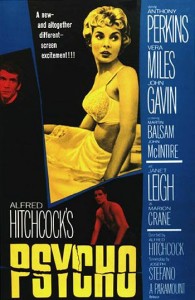 AJ: But he’ll stand there and he’ll improvise in the moment. Hitchcock would never have done that. It’s all so precise and that’s what I think separates them for a start. It’s funny, ever since Psycho if you’re dealing with a psycho-killer in any movie, there is bound to be some Hitchcock analogy there along the line, but to be honest with you, that is one of the reasons why I saw ‘Crystal Plumage in the first place. On the poster there was a quote that said, “Not since Psycho have you seen anything as shocking.” That’s bound to get you in anyway, but it’s only when I look back I realize really that’s got nothing to do with it. It’s not really that shocking in the way that probably Psycho was. Now I look back at that and there are moments, like where he goes into the hotel wearing the yellow raincoat which is seen as very Hitchcock, but you know Dario, like everybody else, especially because he was a film critic, he knew all of Hitchcock’s films and it might have seeped in anyway. But I think just to call him that is not really quite accurate and I think what’s past…even Cat Of Nine Tails, I think the Hitchcock tab wasn’t really properly used.
AJ: But he’ll stand there and he’ll improvise in the moment. Hitchcock would never have done that. It’s all so precise and that’s what I think separates them for a start. It’s funny, ever since Psycho if you’re dealing with a psycho-killer in any movie, there is bound to be some Hitchcock analogy there along the line, but to be honest with you, that is one of the reasons why I saw ‘Crystal Plumage in the first place. On the poster there was a quote that said, “Not since Psycho have you seen anything as shocking.” That’s bound to get you in anyway, but it’s only when I look back I realize really that’s got nothing to do with it. It’s not really that shocking in the way that probably Psycho was. Now I look back at that and there are moments, like where he goes into the hotel wearing the yellow raincoat which is seen as very Hitchcock, but you know Dario, like everybody else, especially because he was a film critic, he knew all of Hitchcock’s films and it might have seeped in anyway. But I think just to call him that is not really quite accurate and I think what’s past…even Cat Of Nine Tails, I think the Hitchcock tab wasn’t really properly used.
JB: Today, in hindsight, when you watch a film like Frenzy, there seems to be a giallo influence; maybe even specifically an Argento influence. Do you think that on a conscious level Hitchcock was following a trend?
AJ: Hitchcock always did do that, didn’t he? He was kind of following like Clouzot’s work and the whole Diabolique thing. It was one of the reasons why he wanted to do Psycho and he was very well aware of what people like William Castle and other foreign/Euro directors were doing. So he might have done…Frenzy is always called, here, a British giallo anyway; very much like All The Colors Of The Dark, if you know that Sergio Martino one, because that’s set in Britain. So these are very much seen as sort of British gialli, but I’m not even sure. I just think he was just using tropes that were sort of popular at the time and I don’t think it would have even crossed his mind, but I would have imagined that if you’re somebody like Hitchcock and you see a film that says “Oh, not since Psycho…” you’d be interested in going to see it. Wouldn’t you?
JB: (laughs)
AJ: I would!
JB: Yeah.
AJ: I mean he’s got a private cinema. Surely he can just ring up the production company and say, “Send this over and I’ll show it in my private cinema.” (He laughs)
I would imagine that, but I don’t know if it would be true or not. Dario often won’t admit to seeing films of other directors, so he doesn’t have to have an opinion of them. Whereas I know he actually does see things. So he can do that. Perhaps Hitchcock was playing the same game. I don’t know.
JB: You mentioned a few of his more recent films that you’re not particularly a fan of.
AJ: Uh-huh.
JB: And you mentioned that there are fans that give his post-Opera work a hard time.
AJ: Right.
JB: I watch some of his later work and I often get the feeling that fans have expectations and that in some cases if they weren’t “Dario Argento films,” people would not be giving them such a hard time.
AJ: Yeah, could be.
JB: Obviously what is good or bad is a matter of opinion, but do you think that his work is sometimes judged unfairly, because of expectation?
AJ: Absolutely. No, clearly people want what he did before, just different and when they don’t get it they get really upset. We’ve had long discussions about Dracula, which is not very good, but he thinks it’s his new path. He can explain it very well, on what he thinks he’s doing with that, like with everything else. Mother Of Tears, I must say completely confounded me and then he said “But no, no it’s a visual joke. It’s all in that last scene, when they come out they’re laughing. It’s a joke that’s gone on. It’s not serious.”
So he sees it and he doesn’t quite get the fact that the fans don’t see it that way. To me that was his mistake. If Mother Of Tears had been even a halfway decent film he would have been fine, but because it was so, what none of us were expecting…when you look at Suspiria and Inferno, that’s the third part? Well really! You know what I mean? It’s almost like so-so…it’s like a joke, really.
JB: When I saw it, I felt like it actually felt more like Fulci, in a lot of ways, than Argento.
AJ: Well, yeah…could be. He’s another one that Dario would never, ever mention really. As far as he’s concerned Fulci was no competition whatsoever. In fact the only time they ever got together was because, he was trying to save Fulci’s career, The Wax Mask. That didn’t pan out.
But there are bits in every film I like. I have a really strange situation with his movies, because when I look at Dracula, all I see is having the best time for five days in the middle of a forest with Thomas Kretschmann, who I absolutely adore; in one of the loveliest summers in Italy and we had a great time and it was one of the nicest times I’ve ever had on one of his film sets. I look at Phantom Of The Opera and all I remember from that really, now… people hate that film. I actually quite like it, but I look at that and I’ve got a fond nostalgia for hanging around the opera house they filmed it in and having a really good time. Do you know what I mean?
JB: Sure.
AJ: That doesn’t stop me from being critical about the film in general, but I just have a different sort of view on it from that point of view. Everyone hates The Card Player, but Leon Cunningham, I just adored in that. We got on like a house on fire. We kept in touch. We still talk about the daftness of that movie, but do you know what I mean?
So it’s a case of that. I find it very interesting. Whenever he makes a new film, I’ll be there. He knows that. I won’t let him down when it comes to that. I promised him all those years ago that I would always make sure his fans knew what he was up to and would keep them informed and I’ve always done that. So I’m not going to break that promise now. And I’ve done very, very well out of the Dario Argento business, to be honest with you. Because, you know, it’s not just the books. It has got me to major places. I mean when you know him and you’re in Italy, you know everybody. Trust me! It’s a case of I can get to everybody. It’s really quite extraordinary. Just being able to do that is just, I think, fantastic.
JB: You hear about how big he is in Italy and Europe, but it is really hard to gauge that kind of thing here in the U.S. because it is all second hand. So every time I meet and become friendly with someone from Italy, I always ask about Argento’s films.
AJ: Mmm-hmm.
JB: One constant is they all seem to love Deep Red. It seems to be their favorite.
AJ: Yeah.
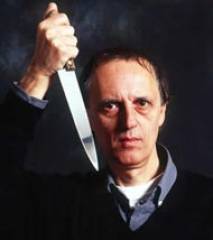
JB: And it is funny, because one person I asked really downplayed his popularity and then unintentionally completely contradicted himself. He started out with, “He’s not really that big” and then by the end of the conversation he was like “Oh but everybody knows who he is there and has seen his movies.”
AJ: You can’t walk down the street with Dario, because you get mobbed. That was a real shocker for me the very first time I did that and even in a car people are beeping their horns and yelling and staring at him. It is quite extraordinary how that works. It is rock star status…even now. And especially, whether you know this or not, but in the last year he’s been on television. He does two things on television at the moment. He’s always on Sunday evenings talking about his favorite football team, soccer team, with lots of sports pundits and he’s quite a, sort of, visible face. And also he’s just done a hundred top horror films of all-time and he’s introduced each one. A lot of those have been his of course and they used it as an excuse to show his back catalogue, but it’s other things as well and he’s introduced that and that’s actually brought him back into the public eye in a big way at the moment. So this is still carrying on.
JB: People that know you for your writings about cinema and for your audio commentaries might not know that you actually wrote a book about disco.
AJ: That’s true. I did it mainly because I wanted to write something else other than film.
JB: Sure.
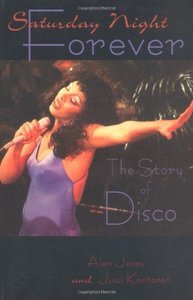
AJ: …to see if I could actually do it. The weirdest thing is that it’s been my biggest seller all over the world. I’ve had it translated in so many different languages. Even America had it, under a different title there, Love Train. As a result of that I’ve done very, very well out of it. (He laughs) What can I say? Who knew?
Obviously Dario was going to be a very niche market. Rough Guide to Horror would be a bit broader in appeal, but it’s the disco one that has gone the distance for me. So it’s really good. When you work in this area, freelancing, you’ve really got to have as many strings to your bow as possible.
JB: Sure, sure.
AJ: So whatever is going to pay me the money, I will do. Disco and my Frightfest Film Festival is what allows me to be able to do the labors of love like the one with Nicholas (Winding Refn) so it’s all good.
JB: When you say, “disco” here (in the U.S.A.), people assume you’re talking about a time period and a specific type of music of the 1970’s.
AJ: Mmm-hmm. Well that’s always been a problem with America, because once the whole disco thing died and people were burning records in Comiskey Park, that was the end of it, whereas in Europe and the rest of the world disco is still a very viable genre. You go to every single place, music store, anywhere and it’s still being played and it’s what it’s called. It’s only America that’s has a bit of a snobby thing about it. They don’t care. America, New York especially, might have started the trend, but we ran with it and that’s what happens. I do find it a bit depressing that America won’t embrace that side of their music, but hey there you go.
JB: And you also talk about disco a lot on television as well.
AJ: All the time. I’m always on television talking about it; funnily enough, more than I am talking about horror.
JB: Just to clarify for the American readers here, you’re talking about a much bigger scope of disco than we might be familiar with.
AJ: Well, I am talking about that specific time period, the mid-70’s to 1981, but how it’s broadened off; how it’s still around…yeah, The Joy of Disco is my latest TV show. The Day Britain Turned Disco is another TV show I’ve done. I’ve done Dancing Queen, ABBA and Disco. I’ve done so many of them, really, that it’s just now getting quite boring! I think. (He laughs) I’ve rolled around the BBC on various programs. So many people are getting sick to death of seeing me, but that’s good. I mean that’s just the way it is, with that one.
JB: Perhaps the sentiment is different in Europe, but here in America I think people would find it very interesting that you’re a man that kind of straddles two very different worlds. Clearly you’re very knowledgeable and passionate about disco, but you also have very strong ties to punk. I think people, here anyway, might find that very odd.
AJ: I’ve been asked all about that in newspapers, here and — I don’t know you at all. So from a personal side of things I’m not going to explain it, but it came from the fact that punk, to me was something really specific. It was all about the Sex Pistols and I was like going between both, sort of, camps at that time. So it was never a problem to me. It was just music of the time and I was embracing both. I mean, you know. I wanted to be in the punk world all the time, but I couldn’t. I was the Sex Pistols D.J. and all that was fine, but I just wanted to do something else as well. So it’s not that unusual, to be honest with you.
JB: I’ve read in multiple articles that you were the Sex Pistols D.J.
AJ: Mmmm-hmm
JB: What exactly did that entail? What was that position?
AJ: Well, that actually meant going to various gigs and playing the music before they came on to do their set. I only did it a couple of times, but most of the times I was actually in the audience, because when you’re part of that, like entourage, you were just there. I’ve stopped doing those kinds of interviews now. I used to be on every sort of punk history TV show as well. I really don’t want to talk about that anymore to people, because it’s very personal to me.
JB: Sure.
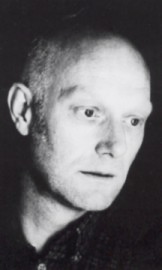
AJ: I said all there was to on Sid Vicious quite a long time ago, and that’s all a specific era now. I know people come to me, because I‘m one of the few people left alive who was actually around at that time. So before I do anything like that ever again, I actually need to know what the angle is on the show, because I just can’t, you know, won’t do it if it’s just going to be a really sort of superficial thing and they’re just going to do, “oh and this and that.” I won’t do it any longer, because that was a very formative time for me. It was all happening at the same time. I was becoming a horror film journalist, disco was happening and I was working for the Pistols. So it was all quite a hotbed of influences going on there and to this day, everything that I did back then is still impacting on my life now.
JB: Sure.
AJ: So it’s quite an interesting career. When I actually look back…I mean, I didn’t do it by accident, but it’s weird. I didn’t do it by any design, rather, but it’s just the way it happened. So, all good.
JB: I don’t think that this would be a personal question, but just out of curiosity, what kind of music would you play before a Sex Pistols show?
AJ: Ah! Well that was one of the main things that, Johnny (Rotten) especially, would scream at me about. I used to go between “White Punks on Dope” by The Tubes to, something like the theme song to Thoroughly Modern Millie by Julie Andrews, just as a complete contrast. And they used to hate that, but I thought it was funny. It made me laugh. I wasn’t just going to play punk music, because mainly, you couldn’t get half of it back then. It was very, very difficult to get, especially in the early days when no one was being recorded. Well nobody had a record deal, so what else was I going to play? “Oh, don’t play the Ramones,” you know, “they’re rubbish,” Yeah well what else is there?” (He laughs) Which is why I used to switch it up with a few bits of things they weren’t expecting; like Julie Andrews, for a laugh. I thought it was funny. (He laughs)
JB: With this new project, I know you can’t really discuss it at the moment, but do you know when you might be able to?
AJ: Well, we’ve just gone through a timeline to be honest with you, about publication and everything. So we’ve brought it forward slightly. I’m not going to talk about it. I don’t want Nicholas (Winding Refn) to talk about it either. So I think the idea is to start announcing stuff in February, from that moment on and then we’ll take it away, but it’s a good one, and it’s going to take me around the world. Who knows, I might actually end up in New York with this one. So it’s going to be good. I’m hitching my wagon to Nicholas’s star and it’ll be good, I think.
JB: That’s great. I look forward to hearing more about it when the time comes. I want to thank you for your time.
AJ: Not a problem.
*This interview was originally posted on podwits.com on October 31st, 2013.
